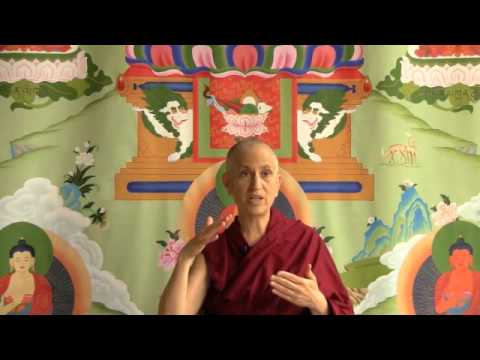Hindrances to concentration: Doubt
Stages of the Path #127: The Fourth Noble Truth
Part of a series of Bodhisattva's Breakfast Corner talks on the Stages of the Path (or Lamrim) as described in the Guru Puja text by Panchen Lama I Lobsang Chokyi Gyaltsen.
- How doubt is like trying to sew with a two-pointed needle
- Some doubt is good, as it gets you to ask questions and investigate
- The different kinds of doubt and the different antidotes
We’ve been talking about hindrances to meditation. We talked about sensual pleasure and attachment, ill will, drowsiness and dullness, and restlessness and remorse, and today we’re on doubt.
I’m not quite sure what I’m going to say… [laughter]
But that’s kind of where doubt leads us in our meditation practice, is we get stuck. They say doubt is like trying to sew with a two-pointed needle–you can’t go this way and you can’t go that way.
There are different kinds of doubt and there are different antidotes to doubt.
Some kind of doubt is quite good, because it’s a curiosity and we want to know more. That kind of doubt really probes us to think more, and ask questions, and talk to people, and read, and learn, and that kind of curiosity–we can call it a form of doubt–is quite good.
But when we’re using the word “doubt” here, the doubt that is a distraction in our practice, is when we go: “Well, are these the right teachings to follow? Is this the right order to do the meditation in? Should I be really meditating, or maybe I should be doing social work? Or maybe I should be studying… Or maybe I should be doing something else. Maybe I’m not really practicing correctly, because I’m not doing the right thing that I should be doing.”
You know that mind? And it’s just this mind that just kind of meanders and doesn’t do anything because it’s just so full of doubt and hesitation and unclarity.
The antidote to that kind of doubt is either to consult with somebody if we need help, which is often very effective because that person can help us see what the real issues are for us. Or another antidote is to really focus in our meditation, to just put our doubt aside, and recognize it as a hindrance, and then focus on learning the teachings and practicing them. Because the ego mind, it throws doubt in as a way just to distract us, doesn’t it? And doubt is so deceptive as a distraction because we really believe it. We really follow it, and we go, “Oh, yeah, maybe this isn’t so good, I should be doing something else.” And that just distracts us from what we do.
Even outside of meditation practice, many people in their lives, they’re just so full of doubt that they can’t do anything, or they’re always changing their minds, can’t follow something through, so it becomes a real problem. I think setting ourselves down and really focusing on what we’re intent on doing, and trying it–not just for a little while but for a good chunk of time–and then assessing it as we go is a good way to really show ourselves something. Or consulting somebody and making a plan and then sticking to the plan. Or if we don’t understand a teaching, asking questions and learning, and then implementing what we learn.
A lot of people have doubts, and then they meander, then they ask a question, they get good advice, and then they don’t apply it. Or their first reaction to the advice is, “Yes, but…” And then their second reaction is, “Yes, but.” Then the mind just stays stuck. So I think sometimes we need to have some self-confidence, and just go forward with our practice, and with our meditation, and the good work we’re doing, without this constant chatter in the mind about, “Maybe I should be doing something else.”
Venerable Thubten Chodron
Venerable Chodron emphasizes the practical application of Buddha’s teachings in our daily lives and is especially skilled at explaining them in ways easily understood and practiced by Westerners. She is well known for her warm, humorous, and lucid teachings. She was ordained as a Buddhist nun in 1977 by Kyabje Ling Rinpoche in Dharamsala, India, and in 1986 she received bhikshuni (full) ordination in Taiwan. Read her full bio.


